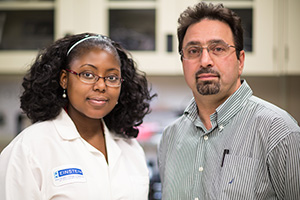

Nurturing Diversity
Einstein's PREP Program: Nurturing a Diverse New Generation of Researchers
From its inception, Einstein has been known for its collaborative culture, with researchers working across disciplines to uncover clues to the genesis of and potential treatments for various diseases. And, it was founded on the principle of welcoming students from all racial and ethnic backgrounds. Yet, a challenge for all research institutions like Einstein is the need to address the disparities that remain with regard to preparing gifted students of all backgrounds for careers in biomedical research. A new program, funded by a grant from the National Institute of General Medical Sciences of the National Institutes of Health, aims to address this important issue.

PREP scholar Schnaude Dorizan with her mentor, Dr. Kamran Khodakhah The grant—$1.4 million over four years, awarded to Dr. Myles Akabas—supports the establishment of a Post-Baccalaureate Research Education Program at Einstein. Known as PREP, the program—1 of only 28 in the country—offers recent college graduates from groups that are typically underrepresented in science and medicine a year-long, intensive research experience that will allow them to be competitive applicants to rigorous Ph.D. and M.D.-Ph.D. programs. The program combines classroom learning and a concentrated research experience with mentorship at all levels.
Dr. Akabas, who is director of the Medical Scientist Training Program at Einstein and professor of physiology and biophysics, of neuroscience and of medicine, is co-director of PREP in conjunction with Drs. Victoria Freedman, associate dean for graduate programs in biomedical sciences, and Genevieve Neal-Perry, associate dean for diversity mentoring.
To be selected as a PREP site, the College of Medicine had to meet a number of criteria. “We needed to show that we were a research-intensive institution with a significant number of faculty mentors with active and well-funded research programs to support the research and academic training of participants,” explained Dr. Akabas. "We also had to have strong Ph.D. programs in biomedical and/or behavioral sciences with first-rate pre-doctoral students who can provide excellent and challenging, but supportive, peer mentoring to PREP students. Fortunately, we have all of these assets in abundance."
In selecting students to participate in the program, he noted, "We sought individuals who had a bachelor's degree, who are interested in studying for a Ph.D. or an M.D.-Ph.D. and who have a passion for science."
The College of Medicine welcomed its first PREP scholars at the start of this academic year. Among these five individuals is Schnaude Dorizan, a political refugee from Haiti who grew up in Brooklyn, NY.
Ms. Dorizan was first inspired to do medical research when her younger sister was diagnosed with juvenile onset diabetes at age 12. "It was extremely difficult for me to see her struggle daily with the illness. I decided that it was up to me to end her pain," she recalled. "That passion continues to drive my current research, even though it's in neuroscience."
Ms. Dorizan graduated from the University of Maryland Baltimore County (UMBC) in May 2013, with degrees in biology and in psychology. While at UMBC, she participated in the Meyerhoff Scholarship Program, which is dedicated to increasing diversity in science, engineering and mathematics by preparing talented minority students for doctoral study.
Not feeling quite ready for graduate school, when Ms. Dorizan learned of the PREP program at Einstein, she applied. "PREP offers a long-term, extensive research experience that allows me to hone my skills in the laboratory," she explained. "It permits me to work at a doctoral level without the pressures of graduate school, while providing the guidance, training and preparation I need to succeed. I've been able to prove to myself that I'm more than capable of succeeding in graduate school and I've gained the confidence to push myself towards that goal."
Ms. Dorizan is interested in the brain and its relation to behavior. Eventually, she would like to focus on the neural basis of learning, memory and behavior, particularly in neurological disorders. Currently, she is working in the lab of Dr. Kamran Khodakhah, studying the role of the central lateral thalamus in coordinating communication between the cerebellum and basal ganglia in mice.
"I love that I get to do hands-on work figuring out the function of various parts of the brain," she said. "It's really exhilarating when you can answer one of the many questions you've asked."
Her future plans? "I haven't explored many career options outside of academia yet, but I know that I'd like to be a professor of neuroscience and continue contributing to the wealth of knowledge in the field," she said. "There is little representation of women in neuroscience, let alone minority women, so pursuing my dreams will hopefully inspire others from similar backgrounds to pursue theirs as well."
Posted on: Monday, January 13, 2014

Tablet Blog